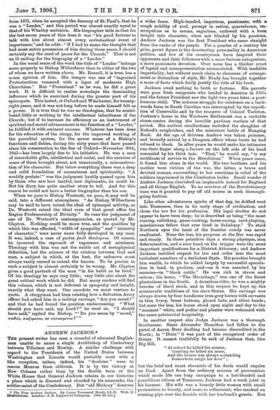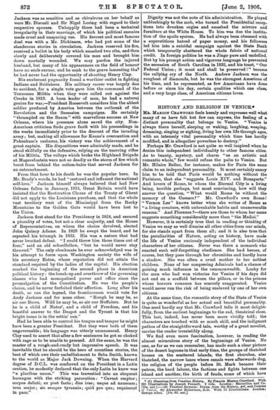ANDREW JACKSON.* THE present writer has seen a roomful of
educated English- men unable to name a single Archbishop of Canterbury between Tillotson and Howley. A similar challenge with regard to the Presidents of the United States between Washington and Lincoln would probably meet with a like reception, unless, indeed, his "doctrine " were to rescue Monroe from oblivion. It is by the victory at New Orleans rather than by the double term at the White House that General Jackson retains in our histories a place which is dimmed and clouded by his namesake, the soldier-saint of the Confederacy. But "old Hickory" deserves
• The True Andrew Jackson. By Cyrus Townsend Brady, LLD. With 23 Illustrations. London : J. B. Lippincott Company. [10e. 6d. net.]
a wider fame. High-handed, imperious, passionate, with a rough nobility of soul, prompt in action, quarrelsome, un- scrupulous as to means, sagacious, endowed with a keen insight into character, when not blinded by his passions, Andrew Jackson was the first President who came straight from the ranks of the people. For a quarter of a century his grim, gaunt figure is the dominating personality in American politics, and few of his countrymen have inspired their opponents and their followers with a more furious antagonism, a more passionate devotion. Over none has a thicker crust of legend and misrepresentation accumulated. With laudable impartiality, but without much claim to clearness of arrange. ment or distinction of style, Mr. Brady has brought together a mass of facts which fairly justify the title of his book.
Jackson owed nothing to birth or fortune. His parents were poor Irish emigrants who landed in America in 1765, and the future President saw the light two years later, a post, humous child. The arduous struggle for existence on a back. woods farm in South Carolina was interrupted by the expedi tion of Cornwallis and by the troopers of Colonel Tarleton. Jackson's home in the Waxhaws Settlement was a veritable storm-centre during the horrible partisan warfare of that period. His earliest recollections included the slaughter of Buford's roughriders, and the miniature battle of Hanging Rock. At the age of thirteen Andrew was taken prisoner, and brutally sabred by a Dragoon officer whose boots he had refused to black. In after years he would make his intimates run their finger along a furrow on the left side of his head concealed by his thick hair. " That," he would say, " is my certificate of service in the Revolution." When peace came, it found him alone in the world. His two brothers and his mother were victims of the war, the latter, a brave and devoted woman, succumbing to her exertions in relief of the soldiers imprisoned in the Charleston hulks. Small wonder if Andrew Jackson cherished an implacable hatred for England and all things English. To no survivor of the Revolutionary wars was it granted to pay off old scores in such thorough- going fashion.
Like other adventurous spirits of that day, he drifted west into Tennessee, then in its early stage of civilisation, and chose the law for his profession. His legal studies do not appear to have been deep; he is described as being "the most roaring, rollicking, game-cocking, horse-racing, card-playing, mischievous fellow that ever lived in Salisbury." To staid Northern eyes the taint of the frontier rowdy was never eradicated. None the less, his progress at the Bar was rapid and steady. In those primitive days a strong physique, iron determination, and a sure hand on the trigger were the most important qualifications for a District Attorney; and Andrew Jackson instilled respect for law and order into the most turbulent members of a turbulent State. His practice brought him wealth, to which he added largely by successful specula- tion in land, in produce, and—as it was asserted by his enemies—in " black cattle." He was rich in slaves and cotton ; his home, " The Hermitage," was one of the finest plantations in the South. A dauntless rider, he was a mighty breeder of blood stock, and in this respect he kept up the aristocratic traditions of the slave States. His carriage was always drawn by four handsome iron-grey horses with servants in blue livery, brass buttons, glazed hats, and silver bands; but none the less, his house stood open night and day to the "meanest " white, and pedlar and planter were welcomed with the same patriarchal hospitality.
In another respect also Judge Jackson was a thorough Southerner. Since Alexander Hamilton bad fallen to the pistol of Aaron Burr duelling had become discredited in the North; in " Dixie " it was part of the recognised order of things. It cannot truthfully be said of Jackson that, like Big Bill,
"At school he killed his master, Courting he killed six more, And the hearse was always a-standing Somewhere anigh his door" ;
but the brief and exact chronicle of his duels would require. an Iliad. Apart from the ordinary sources of provocation which made life one long campaign to a hot-blooded and punctilious citizen of Tennessee, Jackson had a weak joint in his harness. His wife was a homely little woman with small pretensions to beauty, and none to refinement, who smoked an evening pipe over the fireside with her husband's guests. But
Jackson was as sensitive and as chivalrous on her behalf as were Mr. Disraeli and Sir Nigel Loring with regard to their respective spouses. Unhappily there had been a technical irregularity in their marriage, of which his political enemies made cruel and unsparing use. His fiercest and most famous duel was with a Mr. Dickinson, who had put some of the slanderous stories in circulation. Jackson reserved his fire,
received a bullet in his body which smashed two ribs, and then slowly and deliberately covered his man and brought him
down mortally wounded. We may pardon the injured husband, but many of his appearances on the field of honour have no such excuse, and he sank to the grave lamenting that he had never had the opportunity of shooting Henry Clay.
His exuberant pugnacity found a worthier outlet in fighting Indians and Britishers. His military career was largely due to accident, for a single vote gave him the command of the Tennessee Militia when they were called out against the Creeks in 1813. A born leader of men, he had a natural genius for war,—President Roosevelt considers him the ablest soldier produced by America between the outbreak of the Revolution and the Secession campaigns. He certainly " thrampled on the Saxon " with marvellous success at New Orleans, where his presence alone saved the city. Non- American criticism finds grave fault with his proceedings in the weeks immediately prior to the descent of the invading army ; but, making all allowance for Keane's overcaution and Pakenham's rashness, his victory was the achievement of a great captain. His dispositions were admirably made, and he stood skilfully on the defensive, relying on the unerring rifles of his Militia. The volleys which broke the Highland Brigade at Magersfontein were not so deadly as the storm of fire which burst from behind the cotton-bales that served Jackson for an entrenchment.
From that hour to his death he was the popular hero. In Mr. Brady's words, he had " restored and inflamed the national self-love." Jackson himself always believed that had New Orleans fallen in January, 1815, Great Britain would have insisted that the Restoration Clause of the Treaty of Ghent did not apply to the Louisiana purchase, and that the whole vast territory west of the Mississippi from the Rocky Mountains to the Golden Gate would have been lost to the Union.
Jackson first stood for the Presidency in 1824, and secured a plurality of votes, but not a clear majority, and the House of Representatives, on whom the choice devolved, elected John Quincy Adams. In 1828 he swept the board, and he repeated his triumph in 1832. His was a nature that had never brooked defeat. "I could throw him three times out of four," said an old schoolfellow, " but he would never stay throwed." The only checkmate he ever acknowledged was in his attempt to force upon Washington society the wife of his secretary Eaton, whose reputation did not attain the standard required by the ladies of the capital. His election marked the beginning of the second phase in American political history : the break-up and overthrow of the governing classes who had monopolised power and office since the promulgation of the Constitution. He was the people's choice, and he never forfeited their affection. Long after his death, so ran the legend, the frontiersmen would vote for Andy Jackson and for none other. " Rough he may be, so air our Barrs. Wild he may be, so air our Buffalers. But he he is a child of Natur', and a child of Freedom, and his boastful answer to the Despot and the Tyrant is that his bright home is in the settin' sun."
Had he been able to control his tongue and temper he might have been a greater President. But they were both of them ungovernable ; his language was utterly unmeasured. Henry Clay used to assert that after a few sentences he got so choked with rage as to be unable to proceed. All the same, he was the master of a rough-and-ready but impressive speech. It was inevitable that he should be the hero of countless stories, the best of which owe their embellishment to Seba Smith, known to the world as Major Jack Downing. When the Harvard degree of D.C.L. was conferred on the President in a Latin oration, he modestly declared that the only Latin he knew was "e pluribus unum." This was travestied into an eloquent harangue with the striking peroration : " Caveat emptor , corpus delicti; ex post facto ; dies irae ; usque ad nauseam ; urea major; sic semper tyraimis ; quid pro quo; requiescat in pace."
Dignity was not the note of his administration. He played unblushingly to the mob, who turned the Presidential recep. tions into drunken orgies and smashed the mirrors and furniture at the White House. To him was due the institu- tion of the spoils system. He had always been obsessed with a superstitious hatred of paper money, and his followers led him into a suicidal campaign against the State Bank which temporarily shattered the whole fabric of national credit. In foreign politics he was a Jingo pure and undefiled. But by his prompt action and vigorous language he prevented the secession of South Carolina in 1832, and his toast, " Our Federal Union ; it must and shall be preserved! " became the rallying cry of the North. Andrew Jackson was the roughest of diamonds, but he was the strongest American of his time, and he represented, as few Americans have done before or since his day, certain qualities which one class, and a very large class, of American citizens loves.







































 Previous page
Previous page